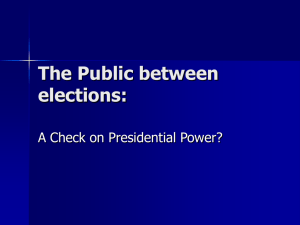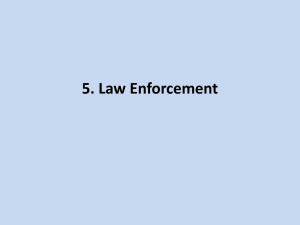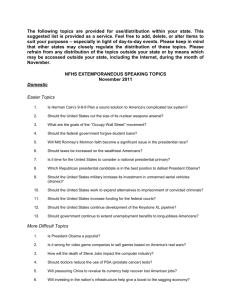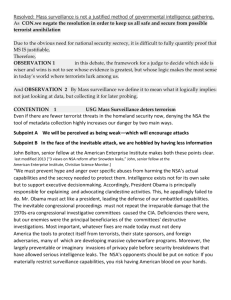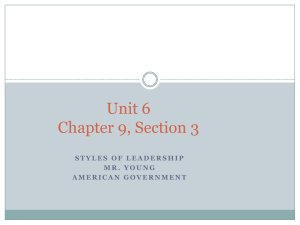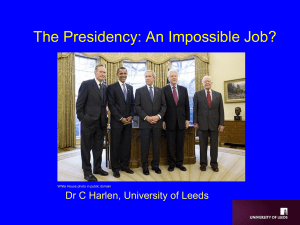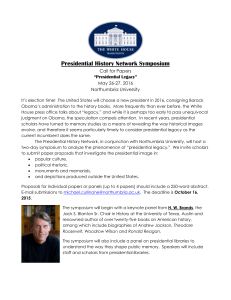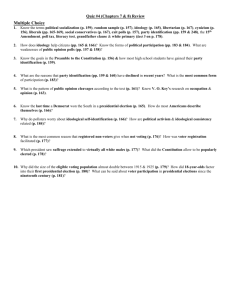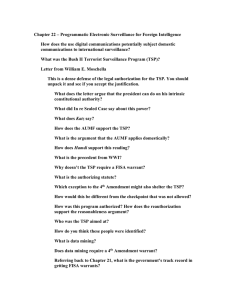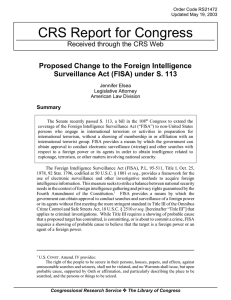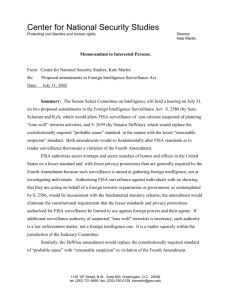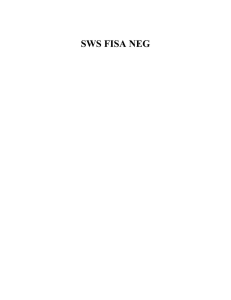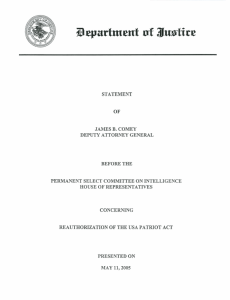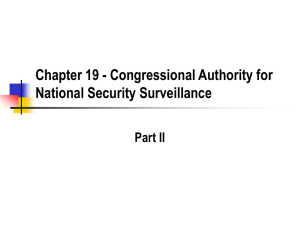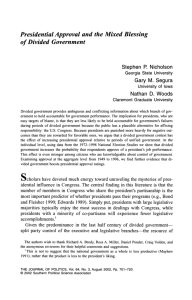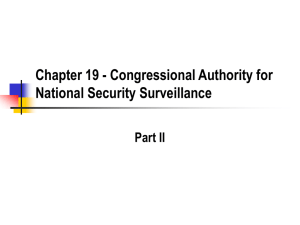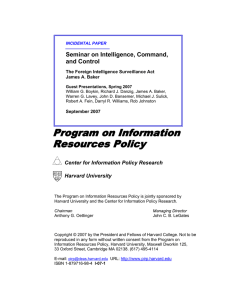Policy Debate: You Decide
advertisement
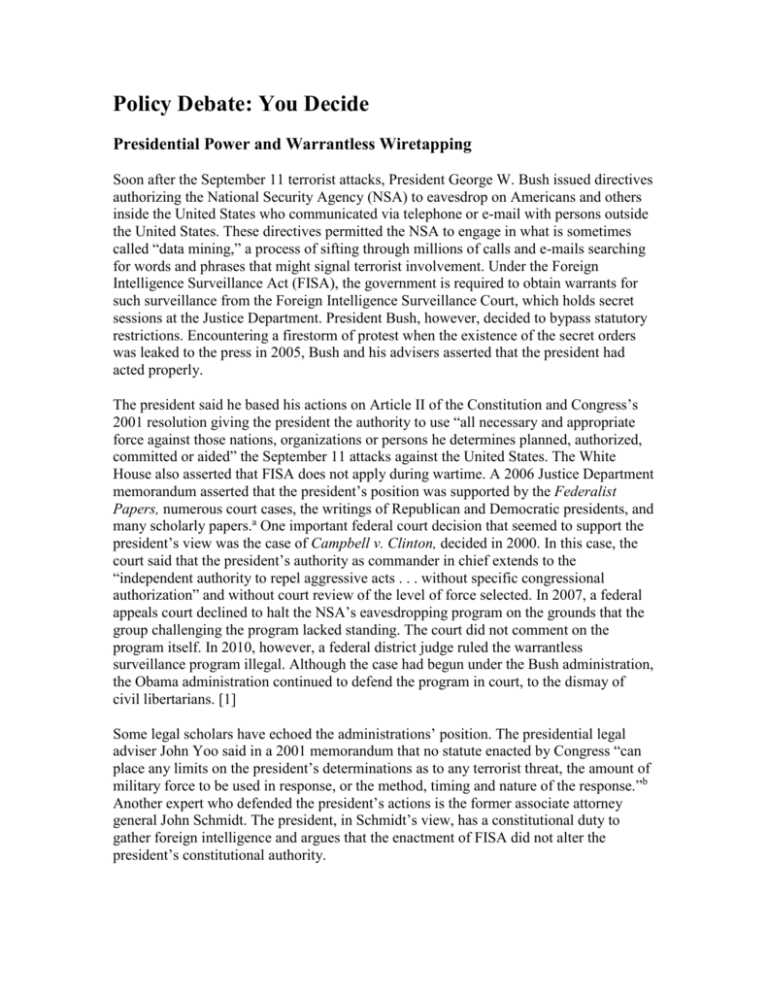
Policy Debate: You Decide Presidential Power and Warrantless Wiretapping Soon after the September 11 terrorist attacks, President George W. Bush issued directives authorizing the National Security Agency (NSA) to eavesdrop on Americans and others inside the United States who communicated via telephone or e-mail with persons outside the United States. These directives permitted the NSA to engage in what is sometimes called “data mining,” a process of sifting through millions of calls and e-mails searching for words and phrases that might signal terrorist involvement. Under the Foreign Intelligence Surveillance Act (FISA), the government is required to obtain warrants for such surveillance from the Foreign Intelligence Surveillance Court, which holds secret sessions at the Justice Department. President Bush, however, decided to bypass statutory restrictions. Encountering a firestorm of protest when the existence of the secret orders was leaked to the press in 2005, Bush and his advisers asserted that the president had acted properly. The president said he based his actions on Article II of the Constitution and Congress’s 2001 resolution giving the president the authority to use “all necessary and appropriate force against those nations, organizations or persons he determines planned, authorized, committed or aided” the September 11 attacks against the United States. The White House also asserted that FISA does not apply during wartime. A 2006 Justice Department memorandum asserted that the president’s position was supported by the Federalist Papers, numerous court cases, the writings of Republican and Democratic presidents, and many scholarly papers.a One important federal court decision that seemed to support the president’s view was the case of Campbell v. Clinton, decided in 2000. In this case, the court said that the president’s authority as commander in chief extends to the “independent authority to repel aggressive acts . . . without specific congressional authorization” and without court review of the level of force selected. In 2007, a federal appeals court declined to halt the NSA’s eavesdropping program on the grounds that the group challenging the program lacked standing. The court did not comment on the program itself. In 2010, however, a federal district judge ruled the warrantless surveillance program illegal. Although the case had begun under the Bush administration, the Obama administration continued to defend the program in court, to the dismay of civil libertarians. [1] Some legal scholars have echoed the administrations’ position. The presidential legal adviser John Yoo said in a 2001 memorandum that no statute enacted by Congress “can place any limits on the president’s determinations as to any terrorist threat, the amount of military force to be used in response, or the method, timing and nature of the response.”b Another expert who defended the president’s actions is the former associate attorney general John Schmidt. The president, in Schmidt’s view, has a constitutional duty to gather foreign intelligence and argues that the enactment of FISA did not alter the president’s constitutional authority. Many top legal scholars, however, believe that the president’s actions were illegal. They argue that FISA clearly makes warrantless wiretapping illegal and that the president knowingly violated the law through his orders. Similarly, in 2006, the American Bar Association issued a statement denouncing the warrantless domestic surveillance program and accusing the president of exceeding his constitutional power. Critics of the program contend that the dangers of unfettered presidential power inherent in President Bush’s actions outweigh the likely benefits. Some critics have said that the president’s logic in defending his actions seemed to suggest that there are no restrictions on presidential power. The Georgetown law professor Jonathon Turley said, “There’s no limiting principle to that theory.”c Along the same lines, in 2012, Attorney General Eric Holder argued that the United States, under orders from the president, is legally justified in carrying out targeted killings of American citizens if they have been involved in terrorist activities. This justification was given in response to the killing of Anwar al-Awlaki, an American citizen killed in Yemen in 2011 who was believed to have been involved in attempted bombings by Al Qaeda. In his speech at Northwestern University Law School in Chicago, Holder explained the circumstances under which presidents may choose to go forward with such an operation: “First, the U.S. government has determined after a thorough and careful review that the individual poses an imminent threat of violent attack against the United States. Second, capture is not feasible. And third, the operation would be conducted in a manner consistent with applicable law of war principles.”d On this issue, critics were upset the President Barack Obama did not pursue the normal path of judicial process, which would involve taking custody of a suspect and going through a trial to determine guilt or innocence. Others disagree, however, and feel that Obama did not cross any lines because of the extenuating circumstances posed by ongoing terrorist threats. On both the issues of wiretapping and carrying out missions of lethal force abroad, presidents have bypassed traditional routes taken in the courts in favor of expanding presidential power. [1] Charlie Savage and James Risen. “Federal Judge Finds N.S.A. Wiretaps Were Illegal,” New York Times. March 31, 2010, www.nytimes.com/2010/04/01/us/01nsa.html# (accessed [date]). a. Eric Lichtblau and James Risen, “Legal Rationale By Justice Department On Spying Effort,” New York Times, January 20, 2006, p. 1. b. Scott Shane, “Behind Power, One Principle,” New York Times, December 17, 2005, p. 1. Yoo’s views are more fully spelled out in his book The Powers of War and Peace (Chicago: U of Chicago P, 2005). c. Joseph Curl, “Legal Scholars Split on Wiretaps,” Washington Times, January 18, 2006, p. A4. d. Terry Frieden, “Holder: Not ‘Assassination’ to Target Americans in Terror Hunt,” CNN, March 5, 2012. 1. Would you have made the same decisions as President Bush to bypass the process of obtaining warrants for surveillance or President Obama to bypass the court system to target suspected terrorists? Why or why not? Does the consideration of the long-term effects on the expansion of presidential power impact your decision? Explain. 2. Past presidents have often assumed expanded powers during times of war. Should the threat of terrorism influence our debates about the Constitution and the laws, particularly as they relate to presidential power? Who or what should be responsible for checking presidents in their use of those expanded powers? Simulation- The Presidency http://www.wwnorton.com/college/polisci/we-thepeople9/full/ch/13/simulations.aspx 1. Click on the Simulation, follow directions, and answer the following questions. How does meeting with senators or donors from states the president didn’t win in the last election help his re-election? The president is attempting to achieve his goals at a cocktail party. What does this say about how the president utilizes his time? Which conversation takes up the most time? a.) Defense contractor b.) Senator from home state c.) Donor from home state How many members of the media are present at the cocktail party? a.) Several b.) Very few c.) Only one

